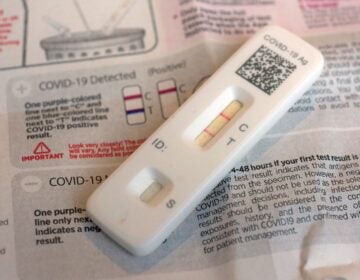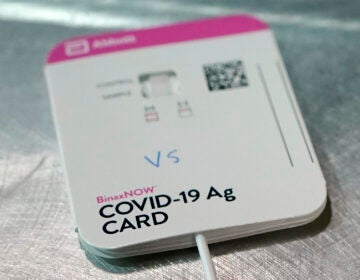Pa. coronavirus update: ‘The epidemic is surging’
Health Commissioner Dr. Thomas Farley warned of increasing coronavirus numbers across the board.
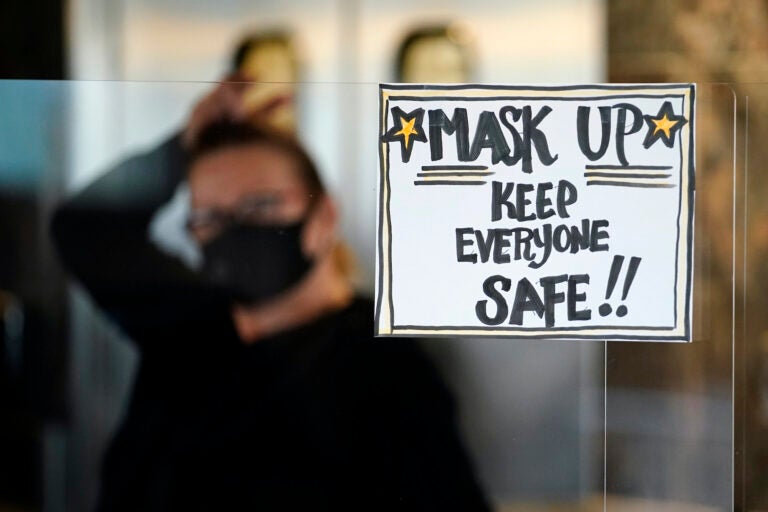
A sign reminds patrons to mask up while inside a Pennsylvania restaurant. (AP Photo/Matt Slocum)
On Thursday, Philadelphia reported 809 additional cases of coronavirus bringing the total to 57,237 since the start of the pandemic.
Additionally, Philadelphia reported three fatalities which takes the total death toll to 1,945.
As of Thursday morning, 542 people in Philadelphia were hospitalized with coronavirus.
Test positivity rates are increasing in the city. Last week, 11.7% of people were testing positive.
Farley: We are seeing ‘all-time highs’
Health Commissioner Dr. Thomas Farley warned of increasing coronavirus numbers across the board.
“[On] the week that ended on November 14, we averaged 849 cases per day. That’s an all-time high. And the percent of people that are testing positive is also increasing,” Farley said.
Vulnerable populations in congregate settings like those in nursing homes and in the city’s jail are also seeing more cases.
Philadelphia nursing homes saw 71 cases last week. In late summer and fall, nursing homes were reporting around 10-15 cases.
“In the spring wave, about half of the deaths that we had in the city occurred in nursing home residents,” Farley said.
There has also been a cluster in the city’s jail. One inmate tested positive which led to the identification of 25 additional asymptomatic individuals. The prison is currently trying to contain the outbreak, according to Farley.
“These numbers are rising and unfortunately, I have to say, we do expect those numbers to continue to grow,” Farley said.
Farley also pointed to increasing numbers in the surrounding regions as a reason to be concerned about the direction of the pandemic.
“Pennsylvania and New Jersey and Delaware are all consistently hitting all-time highs in their daily case counts of COVID,” Farley said.
City working to expand testing
With positivity rates increasing, the need for testing is growing as well.
Last week, the city tested more than 7,100 people per day which is also a new record for the city. This has led to a backlog for some laboratories and a slight delay in results.
“We are seeing big increases in the demand for testing,” Farley said.
Philadelphia health officials are planning on making rapid testing more available. In particular, the city is focusing on the BinaxNow COVID-19 test from Abbot, which comes in the form of a nasal swab sample that is placed into a card. This rapid test can give results in 15 minutes.
“We’re distributing those to test sites now,” Farley said
According to Farley, evidence from case interviews shows that more than half of people who contract the virus don’t know where they became infected. For those who are aware, household members and small social gatherings are some of the main sources of the spread.
Farley: This is ‘possibly the worst period of the entire epidemic’
The new coronavirus numbers now have the city on red alert.
“Our overall message now is that the epidemic is surging. What was once safe is now dangerous with the change in the weather and we’re starting to see severe outcomes that we worried most about,” Farley said.
The new restrictions that the city announced on Monday will take effect Friday at 5 pm and will last until Jan. 1.
The restrictions prohibit indoor dining, indoor sports, gyms, museums and libraries. Outdoor activities come with additional restrictions as well. The complete rundown of the ‘Safer at Home’ guidelines can be found here.
“In the wake of our announcement on Monday, we know that many of the affected businesses are unhappy with these restrictions,” Farley said.
Farley acknowledged that many businesses did put in place safety measures and said that he understood their frustration over these new measures after months of guidelines.
“But remember, now there are more people with the virus than ever and the virus is spreading more readily than ever before. If we don’t act now, there’s a risk that hour hospitals may be overrun,” Farley said.
Farley cautioned those concerned about the business restrictions with a reminder.
“These restrictions are temporary – just six weeks, but death is permanent,” Farley said.
Guidance for Philadelphians during the surge
When it comes to what Philadelphia should do as cases rise, Farley pleaded with people to stay at home.
“Work from home as much as possible. Don’t go to the workplace if you can,” Farley said. “Stay away from others unless it is necessary.”
Farley stressed that even friends and family outside of the household can be carriers of the virus.
With the holidays quickly approaching, the city is warning against gatherings with others outside of the home.
“Celebrate those holidays only with members of your immediate household,” Farley said.
“You don’t want to spread COVID to an elderly grandmother or a cousin with a chronic medical condition at your Thanksgiving meal.”.
For those who have to leave the home during this surge, for example, to exercise, the city wants people to distance themselves from others and wear a mask.
New commerce director to help struggling Philly businesses
On Thursday, the city announced that Michael A. Rashid, President of Michael A. Rashid Associates, will be the new commerce director. The position will help aid businesses ravaged by the pandemic.
“I’m confident that with his impressive background leading and growing multi-billion dollar companies—and with a commitment to our most vulnerable people—Philadelphia businesses will have a champion who knows what it will take for them to recover and thrive in the months and years ahead,” Mayor Jim Kenney said in a statement.
Rashid has a background in the healthcare industry and previously served on the National Council on Minority Health and Health Disparities under the Obama Administration.
“It will take an enhanced focus on partnerships across the public, private and nonprofit sectors to bring about the kind of recovery our city—and its residents—deserve,” Rashid said in the press release.
Rashid will replace Sylvie Gallier Howard, who has served that role in an acting capacity since March.
DOH strikes optimistic tone on vaccine
Even as COIVID-19 cases soar in Pennsylvania, and hospitalization and death rates rise as well, Pennsylvania officials are saying there could be a light at the end of the pandemic tunnel.
Two companies, Pfizer and Moderna, now have vaccines they say are more than 90% effective. State Health Secretary Rachel Levine says that level of effectiveness is an “exciting and positive” development — as is the timeline by which the vaccines could be finished and approved for use.
“If the federal approval process remains on track, we could have a vaccine within the next month. We just don’t know how long the distribution will take,” Levine said.
However, she’s cautioning that the vaccine is not a cure, and will not immediately end the pandemic. And she thinks states need more money to distribute the vaccine than federal officials have so far said they’ll authorize.
Before it’s available, the companies that finish the first vaccines — almost certainly Pfizer and Moderna — will have to request an emergency use authorization from the Food and Drug Administration. The FDA will check the vaccine, and after they authorize its use, the Centers for Disease Control will review it and provide recommendations.
After that, the vaccine needs to be distributed en masse.
Levine says states will be responsible for a lot of the distribution infrastructure. First, the vaccine will be made available to essential workers, first responders and people living in congregate care settings. Then, it goes to targeted populations — people with health conditions that make them high-risk, and vulnerable populations like the elderly. After that, the vaccine would begin to be available to the general population.
So far, federal officials have pledged $340 million to all states, according to Levine. She said it’s not enough for the “prodigious task” of creating complicated infrastructure for vaccine distribution — including mass communication, keeping track of administering multiple doses of most of the vaccines, and keeping the Pfizer vaccine at the -80 degrees it requires.
In the meantime, Levine said, cases are still rising and Pennsylvanians need to take robust precautions to avoid the virus. And even when a vaccine is available, those precautions will have to continue — Levine said she expects vaccinations to be rolled out through the winter, spring and summer.
“It could take a significant amount of time to immunize everyone in Pennsylvania,” she said. “I anticipate that we’re going to be wearing masks in 2021, well into, maybe until the end of, 2021. We’re going to need to wash our hands. We’ll need to social distance.”
She added, she knows people are fatigued by the virus, and that many businesses and workers are struggling.
“We realize that this is all extremely challenging,” she said. “But you can see the numbers that are occurring throughout the United States…we’re going to need to meet this challenge.”

Get daily updates from WHYY News!
WHYY is your source for fact-based, in-depth journalism and information. As a nonprofit organization, we rely on financial support from readers like you. Please give today.


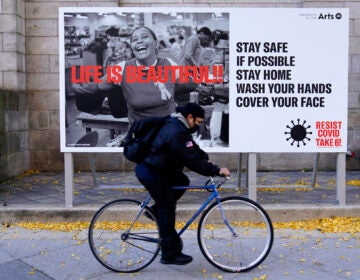
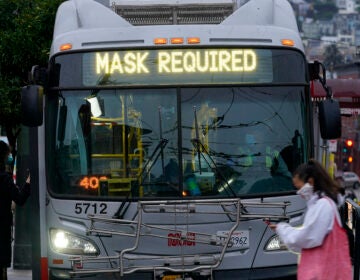
![CoronavirusPandemic_1024x512[1]](https://whyy.org/wp-content/uploads/2020/03/CoronavirusPandemic_1024x5121-300x150.jpg)

